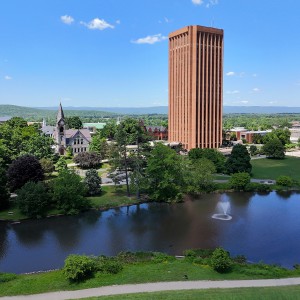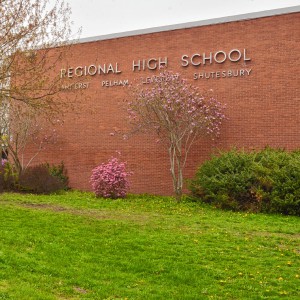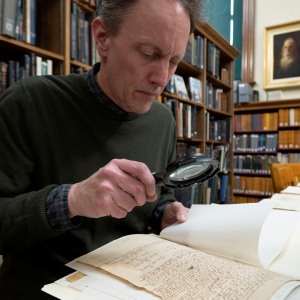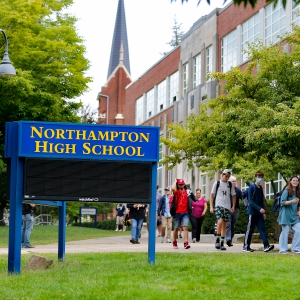A groundbreaking anniversary: Northampton couple reflects on lead role in legalization of same-sex marriage in Massachusetts 20 years ago
|
Published: 05-16-2024 4:54 PM
Modified: 05-16-2024 8:01 PM |
NORTHAMPTON — Friday, May 17, marks 20 years since Gina and Heidi Nortonsmith were married, although the couple is quick to clarify that their real anniversary dates back to more than a decade before that.
The two women met at a conference for LGBTQ lawyers in Atlanta in 1990. Heidi was then a law student at Georgetown University, while Gina had recently taken her bar exam after completing law school at the University of Baltimore. When they saw each other again at a separate conference a few weeks later, the two began dating.
“We dated, and then we made a commitment to each other,” Heidi recalled Thursday during an interview at the couple’s Northampton home to discuss the pivotal role they played in helping to make same-sex marriage legal in Massachusetts 20 years ago. “We were going to be together. We knew we wanted to have children, and we were thinking about where would be the best place to raise kids.”
The couple decided to settle in Northampton in 1994, having known it to be place of welcoming and acceptance for same-sex couples, while also allowing them to be closer to Heidi’s ailing mother. They had two sons, first Avery and then Quinn three years later, with Heidi giving birth to both. But that meant in the eyes of the law, Gina was a legal stranger to her children, despite having helped raise them since birth.
“During this time, the idea of a second parent, another parent of the same gender, was a really new concept. And the thought was you had to wait until the child was a year old, at least, so that when you go to court to say we want to have the second parent adoption, you’d be able to show some kind of relationship,” Gina said. “So between birth and that first year, we wanted to figure out what could we do to indicate that I am a parent? So we met with a lawyer to draw up guardianships and that kind of thing.”
The couple accomplished this with Avery, and with Quinn on the way, they went back to draw up similar documents for their second child. That’s when their lawyer told them of an effort by a Boston organization called Gay and Lesbian Advocates and Defenders, or GLAD, to sue the Massachusetts Department of Health for denying same-sex couples the right to a marriage license. Would they be interested in being a part of it?
At the time, Gina and Heidi did not realize the case would become a landmark ruling that became the first instance of legal same-sex marriage in United States.
“GLAD had brought suit in Vermont, and Vermont was like, oh, domestic partnerships,” Gina said, referring to an earlier case in 1999 where the state of Vermont had ruled same-sex couples had the same legal rights as married couples, albeit only in civil unions. “We thought maybe they’ll do that.”
Article continues after...
Yesterday's Most Read Articles
 UMass faculty calls on land grant universities to join in fight against Trump administration; McGovern, AG also weigh in
UMass faculty calls on land grant universities to join in fight against Trump administration; McGovern, AG also weigh in
 Student petition leads Amherst Regional High to reopen bathrooms during lunch; school will explore other ways to address vaping
Student petition leads Amherst Regional High to reopen bathrooms during lunch; school will explore other ways to address vaping
 Dave’s Hot Chicken plans advance in Hadley; used car dealership eyed across from Hopkins
Dave’s Hot Chicken plans advance in Hadley; used car dealership eyed across from Hopkins
 Jones Library project in Amherst a go: Effort to rescind $46.1M in funding fails at emergency meeting
Jones Library project in Amherst a go: Effort to rescind $46.1M in funding fails at emergency meeting
 Trump’s order to target federal funding vexing to libraries, museums throughout region
Trump’s order to target federal funding vexing to libraries, museums throughout region
 Guest columnist Bryan Jersky: The facts about Northampton school meals
Guest columnist Bryan Jersky: The facts about Northampton school meals
The couple and six others across the state became parties to the case brought before the Massachusetts Supreme Judicial Court, in Goodridge v. Department of Public of Health, that sought to allow the state to issue marriage licenses to same-sex couples. Jennifer Levi, currently a senior director at GLAD (the organization’s acronym now stands for GLBTQ Legal Advocates & Defenders), served as the lead trial court lawyer for the couples.
“It took a tremendous amount of courage for families like Gina and Heidi’s to step up to be part of the lawsuit as plaintiffs,” said Levi, who also lives in the Pioneer Valley. “There was a lot of visibility that made it hard. It impacted people’s extended families, impacted people’s children.”
In the tight-knit community of Northampton, word quickly spread that the couple was involved in the suit.
“We had little kids, so our sphere here was school, preschool and the grocery store,” Gina said. “We’d see the same people over and over who would ask us about what’s going on and some people would be like, what’s really happening?”
Levi originally argued the case before a Suffolk County Superior Court judge, Thomas Connolly, who rejected the lawsuit, saying calls for same-sex marriage should be directed at the Legislature, not the courts. He further added that it was “rational” to limit marriage between men and women for purposes of procreation.
GLAD appealed the case, which made its way to the state’s highest legal body, the Supreme Judicial Court.
“The key strategy really was for people to learn about the plaintiffs and their families, and their love for one another and the dedication and commitment,” Levi said. “And that really, we are all strengthened by ensuring that the law doesn’t create a barrier to people’s love and commitment for one another, and that love is love.”
GLAD lawyers told Gina and Heidi to expect a ruling from the court around July 2003, and to always be up at 8 a.m. to answer phone calls and to have a suitcase packed in case they had to stay in Boston for multiple days. But July came and went, then weeks became months, summer turned to fall, and still no call.
“There were a lot of anxieties in the community, and we felt the weight of that,” Heidi said. “There was some concern that, ‘oh my God, maybe this is a bad sign.’ I mean, nobody really did expect it to win.”
Finally, on Nov. 18, 2003, Gina and Heidi got the call. They scrambled to pack their things and get the kids in the car. They called a friend in the city’s LGBTQ community, current state Sen. Jo Comerford, and asked her to bring diapers and snacks for their children. On the way to the courthouse in Boston, they tuned in to their favorite local morning radio host who would later became a national news personality for MSNBC, Rachel Maddow, hoping to hear any updates the court’s ruling.
“We get to Worcester and if you know that trip, you start to lose the Northampton stations,” Gina said. “And we’re like no, we have to hear it! So she comes on. It’s 10, she comes on and says, ‘We have the decision.’”
In a landmark 4-3 ruling, the SJC found that the state’s constitution allowed same-sex marriage on the basis that it “affirms the dignity and equality of all individuals,” and “forbids the creation of second-class citizens.”
“Because civil marriage is central to the lives of individuals and the welfare of the community, our laws assiduously protect the individual’s right to marry against undue government incursion,” wrote then-Chief Justice Margaret Marshall in the majority opinion. “Recognizing the right of an individual to marry a person of the same sex will not diminish the validity or dignity of opposite-sex marriage, any more than recognizing the right of an individual to marry a person of a different race devalues the marriage of a person who marries someone of her own race.”
For Gina and Heidi, it was moment of elation, and Heidi began pounding on the car roof in joy. When they returned to Northampton, they were greeted with a hero’s welcome, with hundreds gathered at City Hall, blocking off Main Street.
But though the couples had won the legal right to marry, they were not out of the woods just yet. Opponents of same-sex marriage, including then-Gov. Mitt Romney, vowed to stop the law from taking effect, declaring support for an amendment to the state’s Constitution to overrule the court. The ruling was also criticized by then-U.S. President George W. Bush in his 2004 State of the Union address, referring to the SJC as “activist judges,” and called for a constitutional amendment defending the “sanctity of marriage” from same-sex couples.
“It was hurtful in a way that had like extremely tangible repercussions for people. Lots of folks wanted to plan a big wedding,” said Heidi. “They wanted to plan a big wedding and it felt hard to invest all the money into that, knowing that it could be pulled away from you.”
Those efforts, however, did not come to pass. Gina and Heidi applied for their marriage certificate from the Northamton city clerk’s office on May 18, 2004, in order to legally became wives. They decided to merge both of their surnames, Norton and Smith, to become Gina and Heidi Nortonsmith.
Though normally marriage certificates require a three-day waiting period after the application is submitted, the Nortonsmiths received special approval from probate court justice Gail Perlman to receive their certificate that day. The couple held a small private wedding ceremony shortly after, with close friends and family present, before holding a larger wedding party one year later.
Twenty years later, same-sex marriage is now the law of the land, not just in Massachusetts but across the entire United States, since the U.S. Supreme Court decision in Obergefell v. Hodges in 2015. And the current governor of Massachusetts is certainly not opposed to same-sex marriage — Maura Healey became the state’s first lesbian governor when she was elected in 2022.
That same year, President Joe Biden signed the Respect for Marriage Act, a bill requiring the federal government to recognize same-sex marriages, meant as a safeguard in case the Obergefell ruling is ever overturned by the Supreme Court.
An event at the White House celebrating the signing of the act featured several speakers including Biden, Vice President Kamala Harris, singer Cyndi Lauper and Senate Majority Leader Chuck Schumer. And then of course, there was Gina and Heidi Nortonsmith, having been invited as guests of the White House.
“It takes the efforts of many to bend the arc of history towards justice,” Heidi told the crowd then, paraphrasing Martin Luther King Jr. “There are so many places where people in our community are under attack. The work will continue, but look at how far we’ve come.”
Though there have been substantial victories for the civil rights of LGBTQ people in the last two decades, there also remain several challenges. The advancement of rights has led to a subsequent backlash by conservative activists and politicians, particularly in the matters of teaching about LGBTQ subjects in school and providing hormone treatments for transgender youth.
“There’s no room for complacency at this moment,” Levi said. “It’s important that LGBTQ people and those who love LGBTQ people really continue to stay engaged in the political process, that they continue to speak out about the vulnerabilities that people face.”
But through everything, Gina and Heidi have remained together, 20 years after their marriage became officially legal. Their children are now adults, with Avery working as computer science teacher in Philadelphia and Quinn working for a Manhattan investment firm. The couple still live in Northampton, having become something of local celebrities for their role in making LGBTQ history.
“There was that time in the middle when we were waiting, and it felt a bit lonely. It felt a little like there was a lot of attention on us, and we didn’t yet feel good about it,” Heidi said. “But what’s been beautiful and just wonderful to me since the decision was how it went from being a little piece that we could do to something that all of us share together. The victory belongs to the community.”









 ‘Courage, not acquiescence’: McGovern encourages increased engagement during Trump administration
‘Courage, not acquiescence’: McGovern encourages increased engagement during Trump administration Area property deed transfers, April 18
Area property deed transfers, April 18 Reported cuts to Head Start program have Community Action worried about consequences
Reported cuts to Head Start program have Community Action worried about consequences 
